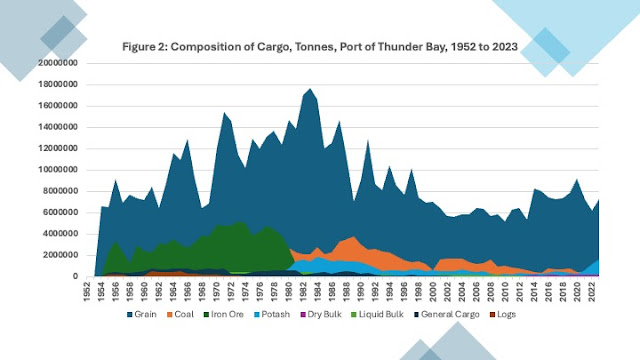Well, we are now nearly six months into regime change in American foreign and trade policy and the subsequent the trade war and it is well worth seeing what the impact of the trade chaos and disruption has been on employment growth in Canadian cities since January. Early in 2025, there was a highly publicized report by the Canadian Chamber of Commerce that ranked Canadian CMAs by their exposure and vulnerability to tariffs based on the trade component of their economies. According to the report, the most tariff exposed cities – and likely to face high economic costs as a result – were Saint John, NB followed by Calgary, Windsor, Kitchener-Cambridge-Waterloo and Brantford Ontario. Also high on the list after these five were Guelph, Saguenay and Hamilton. At the bottom – the least exposed was Sudbury followed by Kamloops, Nanaimo, Winnipeg and Regina.
So, how has employment growth in these cities fared since January of 2025? Figure 1 plots ranked data for Canadian CMAs obtained from Statistics Canada and used to calculate the percent growth in employment from January 2025 to July 2025 (using three-month moving average seasonally adjusted data). A couple of notes. First, Prince Edward Island is included in Figure 1 treating the small island province as a CMA. It is not in subsequent figures. Second, Belleville-Quinte is not included as the employment growth over these six months came out to 90 percent and the official note mentioned there was a small sample issue and to use caution in interpreting – so out it went. There were small sample issues noted for several other CMAs, but they were retained as the percentage changes did not seem as extreme as Belleville.
Figure 1 shows that Canada despite the trade war saw some employment growth going from 20,912,00 jobs in January 2025 to 21,019,900 jobs by July 2025 – an increase of half a percent. Percent growth in employment was greatest in Red Deer (10.4 percent), followed by Hamilton (8.1 percent), Nanaimo (6.3 percent), Saint John New Brunswick (6 percent), Kamloops (5.8 percent) and Sudbury (5.8 percent). Of these 41 CMAs, well over half – 25 of them – saw their employment grow since January 2025. The remainder all saw their employment shrink to varying degrees with the worst hit being Windsor (-5.2 percent), Trios-Rivieres (-4.6 percent), Saguenay (-3.9 percent), Kelowna (-3.2 percent) and Kingston (-3 percent).
Based on what were projected to be the worst hit cities because of their tariff exposure, it appears that there are some surprising anomalies. For comparison purposes, Figure 2 plots the CMAs ranked from highest (most exposed) to lowest (least exposed) based on the February 2025 Canadian Chamber of Commerce study and ranking. Saint John, NB was ranked most exposed and yet at 6 percent growth saw the fourth highest gain in employment across Canada’s CMAs. Calgary was ranked second most exposed but at 1.2 percent employment growth (well above the national performance) ranked 15th highest in terms of CMA employment performance. Most interesting of all is Hamilton, Ontario where there has been much gnashing of teeth and wailing about the demise of steel and its impact on the local economy. Between January 2025 and July 2025, Hamilton went from 421,3000 jobs to 455,600 jobs – an increase of 34,300 jobs or 8.1 percent growth in employment. Hamilton was ranked 8th highest in terms of tariff exposure leading to the expectation it would be nearer the bottom of any CMA employment growth and yet here we are at essentially first place in the country among major cities (because Red Deer’s numbers are also problematic given the small size of the sample apparently).
Now, at the same time, there are some cities where their negative employment growth has matched expectations given their tariff exposure ranking. Windsor was ranked third highest in terms of tariff exposure and indeed has fared the worst of all the CMAs. Trois Rivieres and Saguenay also were highly exposed to tariffs and in both cases are also at the bottom in terms of employment growth. Sudbury, on the other hand was ranked least tariff exposed of all the CMAs and to expectations, its employment growth has been quite good ranking 6th highest in the country.
What this all suggests is that the impact of the trade war and tariffs has probably been more complex and variable on Canada’s assorted economies than one might have expected based either on resilience or local responses as well as other activities which may have taken up the slack. Hamilton, for example, seems rather anomalous but the reality is that it has a large educational and medical sector and has become a major transport and logistics hub both due to cargo through its airport as well as the location of a large new Amazon distribution centre there.
The relationship between tariff exposure and employment growth across these CMAs is further explored in the two remaining figures. Figure 3 is a radar plot of ranked CMA employment against the tariff exposure index, and some very large divergences are obvious. Saint John ranks quite high in terms of employment growth but there is an extremely large tariff exposure spike associated with it. Calgary also is approximately in the top third of employment growth but also has a rather large tariff exposure spike. Figure 4 does a scatterplot with trend charting the relationship between employment growth and the tariff exposure index. Greater tariff exposure is indeed related to lower employment growth on average but there is a lot of variation around the trend.
All in all, some cities have done much better than one might have expected, some have done worse, and some have been bang-on. The factors accounting for this variable performance are probably as numerous and unique as the performance differences and greatly influenced by local economic conditions and responses.











